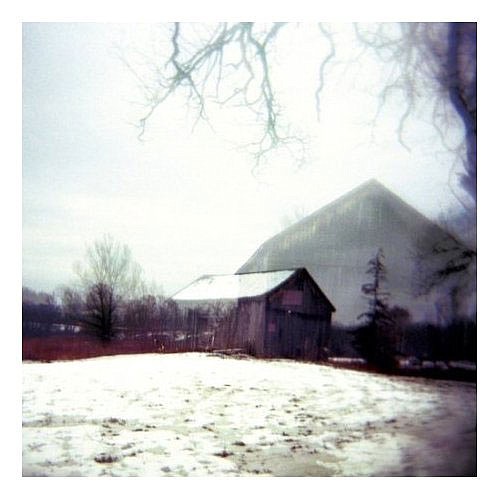Wednesday, November 5, 2008
Horse Feathers - "House with no Home"
3 of 5 stars
Once known as the birthplace of grunge and alternative rock, the Pacific Northwest is slowly becoming a cornerstone for indie folk. Portland, Ore.-based Horse Feathers is doing its part with its antique-sounding folk.
Their latest release "House with No Home" is so evocative of rural America, it feels like it should be the score to a period piece set in Montana rather than a contemporary offering from progressive Portland. Pensive vocals, a crisp fiddle and other Americana accents flush out the album's cinematic foundation.
The bittersweet and nostalgic "Curs in the Weeds" is an instant standout, its sweet tenor accompanied by sparing guitar and dexterous fiddle lines. But "Rude to Rile" is the album's most interesting track, a complex tune showcasing a range of fiddle and guitar sounds from rapid picking to rich sustained tones to more menacing riffs, closing with an impressive fiddle solo.
Horse Feathers' intricate construction makes it quite unusual for a folk group, but in some cases, songs lack the emotional catharsis assured in more intimate folk offerings. The album's best songs successfully blend technical deft with emotional vulnerability. If you're looking for complexity and originality in your folk music, you'll find it on every track.
Their latest release "House with No Home" is so evocative of rural America, it feels like it should be the score to a period piece set in Montana rather than a contemporary offering from progressive Portland. Pensive vocals, a crisp fiddle and other Americana accents flush out the album's cinematic foundation.
The bittersweet and nostalgic "Curs in the Weeds" is an instant standout, its sweet tenor accompanied by sparing guitar and dexterous fiddle lines. But "Rude to Rile" is the album's most interesting track, a complex tune showcasing a range of fiddle and guitar sounds from rapid picking to rich sustained tones to more menacing riffs, closing with an impressive fiddle solo.
Horse Feathers' intricate construction makes it quite unusual for a folk group, but in some cases, songs lack the emotional catharsis assured in more intimate folk offerings. The album's best songs successfully blend technical deft with emotional vulnerability. If you're looking for complexity and originality in your folk music, you'll find it on every track.
TV on the Radio - "Dear Science,"
2 of 5 stars
Brooklyn's favorite intellectual experimental rockers, TV on the Radio, make yet another stylistic change on their third full-length album "Dear Science." Diverging from the expansive rock vitality of "Return to Cookie Mountain," the new album seems to most closely resemble chilled-out electro. Although "Dear Science" retains the band's definitive broad experimental scopeespecially with lead singer Tunde Adebimpe's expressive falsettoits subtle and desultory lounge jams are difficult to force into genre categorizations.
On first listen, the album sounds like über-hip background music with retro smatterings of disco and funk. But songs like "Crying" and "Golden Age," while pleasing at first, eventually wear off to reveal generic and uninspired skeletons. The less visceral tracks age much better as their understated density reveals clever, nuanced cores. The bass-heavy "Dancing Choose" exhibits a propulsive force that joins with a rapid-fire rap for a manically cool track. Opener "Halfway Home" is the perfect contemporary soundtrack: expansive and dense, its dreamy wanderings feeling both uplifting and sad. After a few listens, it seems clear that this brainy album will only get better with age.
Jenny Lewis - "Acid Tongue"
3.5 of 5 stars
California songstress Jenny Lewis is best known for her work in indie-pop group Rilo Kiley, but her recent solo efforts "Rabbit Fur Coat" and the recent release "Acid Tongue" might well change that. On "Acid Tongue," Lewis fuses a combination of uptempo bluesy-rock, funk and country, bringing in famous friends M. Ward, Jonathan Rice and even Elvis Costello. But while the rollicking rock numbers are fun, they seem an unnatural fit for Lewis.
Her natural voice is lovely: soft and sweet, with a charismatic twang, and she's bestand more believableon simple tracks. "Godspeed" and "Trying my Best" are confessional songwriting at its most simple and beautiful, while title track "Acid Tongue" offers a more complex, country-tinged sound. On "Acid Tongue," Lewis sings of loneliness and self-doubt against a strummed guitar backup and appropriate guest harmonies. Lewis uses the common folk tool of narrative revealing universal truths. "Being lonely is a habit/like smoking or taking drugs/and I've quit them both,/but man was it rough," is the most striking example of this.
At her best, Lewis is raw, real and beautiful. Here's hoping she believes in herself enough to keep it up.

Comments
Use the comment form below to begin a discussion about this content.
Sign in to comment
Or login with:
OpenID